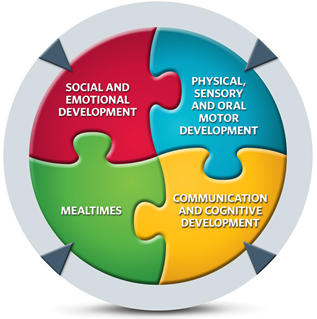Disruptions in one or more area of feeding development or the mealtime environment have the potential to contribute to the development and maintenance of feeding difficulties. The causes are many and varied. Rarely is there a single cause.
Disruptions in feeding development are commonly observed in children with:
Developmental delays. Delays may be transient (e.g. due to prematurity, prolonged hospitalisation or social circumstances that limit opportunities to learn) or persistent (e.g. due to prematurity, cerebral palsy, neurological or muscle disorders, genetic or metabolic disorders, autism, chromosomal anomalies such as Trisomy 21).
Acute illness and chronic medical conditions such as reflux, constipation, respiratory, cardiac, renal, gastrointestinal disorders and severe food allergy have been identified as contributing to feeding difficulties in both typically developing children and those with developmental delays. Common features of these medical conditions that may contribute to the development of feeding difficulties include nausea, abdominal discomfort, constipation, pain or increased work of breathing or fatigue on eating, altered dietary requirements e.g. need for medically prescribed diets or increased requirements. The side effects of many medications (e.g. altered taste, nausea, and constipation) may also be a contributor.
Acquired or congenital abnormalities of the mouth, larynx, trachea or oesphagus such as Cleft palate, Pierre Robin Sequence, Tracheo- oesophageal fistula, Laryngomalacia may make feeding difficult or unsafe.

It is noted that for some healthy children seemingly functional disorders may later reveal an underlying organic cause [9] e.g. Child with food refusal or limited variety may later be diagnosed with reflux or food allergy.
Mealtime strategies can inadvertently be the cause of or contribute to the maintenance of feeding difficulties for all children. Regardless of the initial cause, all children with feeding difficulties are at risk over time of developing further mealtime behaviour problems [9]. It is common for prolonged feeding difficulties to be associated with negative, learned mealtime behaviours as management strategies inadvertently shape and strengthen the problem. When problematic behaviours are reinforced they tend to become more frequent or intense [5].
The feeding development framework provides a systematic method for health professionals to identify potential contributors to the development of feeding difficulties. The addition of wedges to the Feeding Development Framework represents the factors contributing to disruptions in feeding development.
Click a puzzle piece for further information.